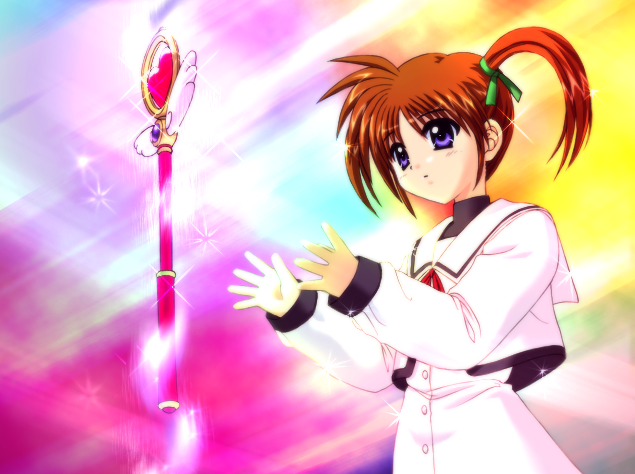Narumi Nitpicks: Rose Gun Days
Without any metafiction narrative, without any mystery, and without any horror, Rose Gun Days stands out from R07's more famous When They Cry series by being a surprisingly striaghtforward, no-frills gangland drama. That doesn't mean it's any less worth reading or alienating if you're a fan of his previous works. At its heart, it's manages to be one of Ryukishi's most captivating works in spite of its simplicity.
In essence, Rose Gun Days tells a very simple story of how a small alliance of Ladies of the Evening became a mafia powerhouse, told through the lens of 3 groups of distinct protagonists from the years 1947 to 1950, with Madam Rose as a central character throughout. Along the way you have a lot of socio-political commentary for the time period and modern times, despite RGD taking place in an alternate Japan, many modern events still occurred as with real life history, and a lot of real world events and figures are directly alluded to in writing. It manages to explore the themes of nationalism, discrimination, corruption, postwar Japan-foreign relationships, Japanese-Chinese relationships, culture, the identity of the self, colonialism, and male-female relationships very delicately woven in naturally with the story without being too overbearing or out of place (with some exceptions involving real world history and events after 1950). There's a lot of scathing self-critique in this and it does come off as depressing several times, but the atmosphere of the setting isn't ever taken for granted and it breathes life into the main narrative.
Ryukishi's prose in this one is surprisingly not as long-winded as most of his other works. In fewer words and fewer scenes, he manages to convey themes of "Shitty Old People hating Youth" and "The futility of deterrence" much better than Ciconia ever did with its "Walls of Peace" spiel that dragged on for way too long. Writing is sharp and very to the point in most cases, and pacing is very snappy. It's very easy to get drawn in and spend hours upon hours just reading in anticipation of the next scene. Suspense and tension are masterfully utilized to draw you into each scene and it's very hard to put the VN down. It's a real page turner. My only gripe with the writing is the Ending feels incredibly rushed and unfulfilling. I would've loved some more scenes with the surviving Primavera crew at the end.
Despite the huge cast, RGD manages to make virtually everyone endearing and likable, or someone you'd really like to hate in the case of villains. Each year introduces a new cast of characters for the reader while giving less focus to the previous year's cast. The writing is strong enough to make these new characters endearing without lessening the impact of the previous cast. Even certain minor characters like Alan's Chinese Brawler friend managed to make an impression on me despite his very brief appearance. Shout-out to best boy Meijiu, who's the absolute best bro out there. While the existence of a rogues gallery means that there in no one central antagonist to build up to, each of the villain of the season manages to captivate me with their presence so much. Hell, Crazy Robber Family Alfred is for my money one of the best scenes in the whole novel . The closest thing to a central antagonist would be Gabriel, who in true When They Cry fashion, is a complete monster that you can't help but love. Someone so consumed by insanity and madness that wouldn't feel out of place with the likes of Takano Miyo (who's also in this game somehow) or Bernkastel. I do wish Gab-chan was around the game since the beginning, maybe to give his presence more meaning at the very least, but I still loved and dreaded each of his appearances. Speaking of villains, Richard's downfall into insanity is done impressively well and is the sort of thing that really pays off with all the foreshadowing and buildup across all four seasons. There are some character imports like with Butler (Battler) and Meryl (Miyoko) with some cute references to the WTC series like Nina being from Shishibone, these references don't define their characters too much, but they do play around with your expectations regarding them and their roles.
I've said it before in my Iwaihime review, but music is what really makes R07's works sing. Rose Gun Days has some of the best music I've the pleasure of experiencing in a VN. It makes the otherwise tedious battle minigames worth it as the battle themes demonstrate the intensity of the many fights in the novel. It's also why the ending to 1st Season resonated with me so much. And having Brand New Way, Broadway play in the "Leo we truly were the Rose Gun Days" scene is practically cheating. Sometimes, the music makes you totally hyped up for what's to come, while other times its surprisingly self-reflective with Jeanne's theme making you look back at the story told so far, and peace eases makes me depressed. Its soundtrack really is up there with some of my favourite VN soundtracks.
I've also read through the extra short story chapter included in the rerelease, Rose Gun Days The Best. It was a cute side story depicting Julie timeslipped into 1947 interacting with the Primavera Family. It's mostly inconsequential and basically serves to hammer home the themes of preserving culture and building a better future for future generations.
Rose Gun Days is an excellent tale that does fumble towards the end. However, the road there is some of the best entertainment I've had in quite a while, and it's amazing this was done with no fancy event CGs, no voice acting, photo-backgrounds, and no lip sync. It shows that all you need for a good time is some good writing and some great music to tell an interesting story.
8/10




Comments
Post a Comment